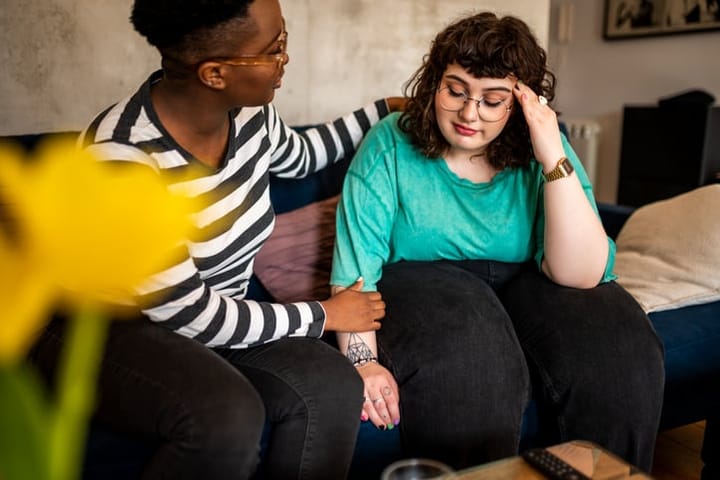The first time I had an anxiety attack, I was 15 years old and lying on the bathroom floor, gasping for air. I thought I was dying. Paralyzed on the tile, unable to move, and struggling for air, I weakly called out to my mom, at least wanting to say goodbye to her. When she burst through the door and saw me on the floor, she sat down next to me and made me explain what was happening. After listening, she calmly told me that I was having a panic attack and that anxiety disorders ran in my family. I told her that my chest was caving in, I couldn’t breathe, and my heart was leaping out of my chest; the phrase “panic attack” sounded too small to compare to the heaviness I was feeling. Yet, that’s exactly what it was.
Several years (actually, over a decade) and a few doctors later, my anxiety disorder is still a condition I struggle with on a daily basis. I’m not alone. Forty million other Americans suffer from one of the three different types of anxiety disorders: Generalized Anxiety Disorder (GAD), Panic Disorder, and Social Anxiety Disorder. According to the National Institute of Mental Health, “Each anxiety disorder has different symptoms, but all the symptoms cluster around excessive, irrational fear and dread.”
Over the years I’ve encountered some super insensitive people and maybe some people who are completely ignorant of the severity of anxiety disorders. With that being said, here are ten phrases you should steer clear of when a friend or loved one has an anxiety disorder:
- “Chill out.” Well, bro, if it were that easy, I wouldn’t be having an anxiety attack, would I? Seriously, this phrase makes my skin crawl. First of all, commanding someone to feel a certain way will never work. Secondly, for a person struggling with anxiety, feeling like a disappointment just for not feeling a certain “normal” way can be a huge trigger and can increase anxiety tenfold.
- “It’s not that serious.” The definition of anxiety is IRRATIONAL fear and dread. More than half of the time, I understand that what I’m panicking about isn’t as serious as it is feeling to me at that moment. That doesn’t change the fact that I’m FEELING like it’s a huge deal because of the disorder. Don’t marginalize someone’s symptoms by downplaying their feelings.
- “Why are you freaking out?” Honestly, I’m freaking out because of the million thoughts running through my head all at once that I can’t process. It’s like when you’re running too many applications on an old computer and you can hear the gears turning and struggling to keep up and then eventually the screen freezes and your mouse won’t move. That’s what your mind/body feels like when you have anxiety.
- “Just think about something else/ignore it.” The problem is that we ARE thinking about something else. And something else. And something else. And something else. All at once. It’s too much. And as far as ignoring it goes….when has that helped any ailment, physical or mental?
- “You look bad/pale/sick.” Thanks. You wouldn’t believe how many times this has been said to me. Once it was said to me in front of a group full of people I’d only just met by someone who knows I suffer from anxiety. That time it hurt the worst, mostly because I was painfully aware that I looked pale and sick. I had just returned to the table after having a full-blown, crying panic attack in the bathroom. I had just finished calming myself a little, taking an anti-anxiety pill, when I returned to the table only to have this person immediately focus everyone’s attention on me by saying how “bad I looked.” Forgivable, maybe, if she hadn’t known. But if you know someone has anxiety, don’t cloak your concern with thinly-veiled insults.
- “There are worse things happening in the world.” Yup. And now I’m thinking about all of those terrible things too. When someone with anxiety is explaining a concern, you should never belittle that concern with a problem you think is worse. They’re telling you about an issue that makes them feel crappy – please focus on that crappy problem instead of directing them to millions of other crappy problems.
- “Have you tried exercising?” Jesus, yes. Unfortunately, not everyone can tame their mental health problems by jogging. While exercising can sometimes improve your overall mood and help you de-stress, some anxiety disorders are too severe for exercise alone to fix.
- “I know exactly how you feel. I get nervous too sometimes.” Comparing normal nervous stage fright feelings to the sheer, paralyzing terror that can grip people with anxiety disorders is to trivialize their ailment. While there’s nothing wrong with wanting to relate to someone to make him or her feel better, don’t do it unless you actually have an anxiety disorder.
- “At least there’s nothing physically wrong with you.” Ah, boy. Here we go. Mental health should be treated JUST AS importantly as physical health. There’s still a stigma attached to getting mental health help that needs to disappear. If you broke your arm, you would immediately be taken to the hospital for treatment. If someone tells you that they’re severely and chronically depressed or anxious, you should be encouraging him or her to seek treatment, not giving a pat on the back and saying, “At least it’s not cancer!”
- “Everything is going to be fine.” Everything is not always fine. I know this a go-to phrase for people trying to comfort others, especially when they don’t know what to say but it’s not always the best thing to say to someone with crippling anxiety. You don’t always get over things but you can always get around them. Acknowledge that some things may not be okay but encourage them that no matter what happens, you will get through it together.
How to be there for someone with anxiety
Contrary to popular belief, a person who shares their anxiety with you isn’t asking you to fix it. They’re often aware that there’s nothing anyone else can do to alleviate the feelings they’re experiencing. Instead, if you want to help, here’s what you can do.
- Don’t minimize our feelings. Even if you don’t get where we’re coming from or disagree with our point of view, never talk us down or make us feel like we’re weird or wrong for how we’re feeling. The best way to be supportive is by validating how we’re feeling and hearing us out either way.
- Offer to listen. While people with anxiety aren’t looking for a magic wand, we do appreciate when people who care about us offer to listen. Sometimes it is helpful for us to be able to voice what’s going on inside of us. When listening to us, don’t interrupt or try to offer solutions unless we ask for your input. Instead, compliment us for our strong attributes, praise us for small victories, and just be a sounding board.
- Just be there. If we don’t feel well enough to leave our house, ask if we’d want to watch a funny movie and order pizza. Overall, just be kind, mindful, and understanding of people with anxiety disorders. We don’t need to be handled with kid gloves, but a bit of sensitivity goes a long way.



